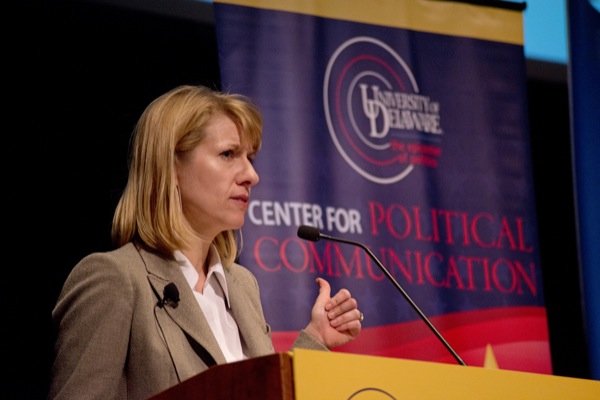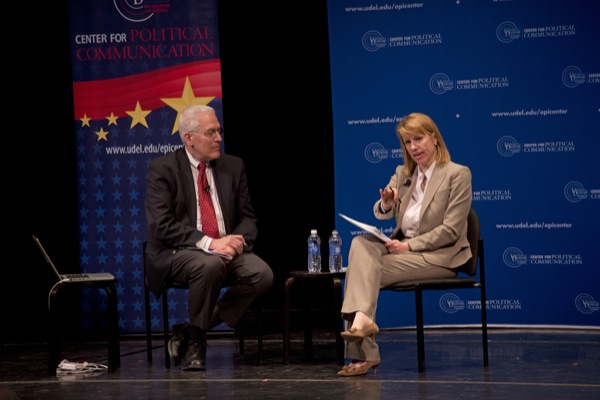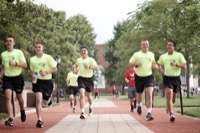Swaying pillars
Former diplomat discusses changing relationship between U.S., Europe
1:53 p.m., April 5, 2013--As global challenges become more complex, the U.S. and Europe must re-examine their long-standing relationship, said former U.S. diplomat Heather A. Conley during a University of Delaware Global Agenda presentation.
Throughout history, the U.S. and Europe have been intertwined, the actions of one affecting the other.
People Stories
'Resilience Engineering'
Reviresco June run
The U.S. rebelled against a European country, and European immigrants helped build the U.S. After some initial hesitation, the U.S. showed up in full force for conflicts ranging from both world wars to the Cold War.
“America has always been there,” said Conley, who spent much of her political life exploring the bilateral connection between Europe and the U.S.
Recently, the relationship between the U.S. and Europe has morphed, thanks in large part to the economic crisis, controversial conflicts in the Middle East and emerging economic powers, according to Conley.
With each region facing internal concerns, the U.S. and Europe are beginning to focus inward and less on each other, a trend that Conley believes could have far-reaching effects.
The three pillars
Conley, senior fellow and director of the Europe Program at the bipartisan Center for Strategic and International Studies (CSIS), said the foundation for the Euro-American connection rests on three pillars:
- Military security intelligence -- The U.S. and Europe are connected through the North Atlantic Treaty Organization (NATO). NATO creates a military pact, declaring that if one member nation is attacked by outside forces, other members will lend support. “That is the cornerstone of our relationship,” said Conley.
- Economy and trade -- The U.S. and Europe have established trade and investment relationships, making them major global economic players. “We are really big when we act together as an economic bloc,” she said.
- The "invisible" pillar -- The third pillar consists of what Conley calls “gooey sentimentality.” Europe and the U.S. share similar cultures, a rich history and similar values on topics such as democracy and human rights.
Recent changes within these three pillars have placed a bit of strain on the Euro-American bond.
After fighting wars in the Middle East for the last decade, the U.S. is “tired,” said Conley, citing the Obama administration’s desire to get out of wars and not get into new ones.
European nations are also hesitant to get tied up in conflicts such as those in Syria and Mali. As U.S. defense spending decreases and Europe doesn’t step in to help, a big question mark arises.
“If we step back and Europe doesn’t step up, what happens?” asked Conley.
She fears that calls for help in global international crises could go unanswered.
Conley said she believes that the U.S. and Europe need to develop a new dynamic when it comes to responding to world crises, working together to lend support instead of simultaneously pulling back or hoping the other will step in.
Conley fears the implications that a domestically distracted U.S. and Europe could have on world affairs.
“We must be involved, if not, we will be involved later, and at a great cost,” she said.
The Euro-American relationship continues to morph as both regions try to climb out of economic depths.
Conley discussed a circle of finger-pointing in regard to the economy. Europe blames the U.S. for creating the economic mess, while the U.S. blames Europe for not being able to handle their own issues, in turn, slowing down American recovery.
“We are a dim reflection of each other,” she said.
As the global market becomes more complex with rising economic powers in Asia, Conley said she believes that Europe and the U.S. need to stop pointing the finger and start helping one another economically.
The stability of the “invisible pillar” has also wavered, according to Conley. As a result of the Iraq War, the U.S. has lost some credibility when it comes to humanitarian efforts and development assistance.
“We need to regain global trust,” she said.
The future
Conley illustrated two potential scenarios for the future Euro-American relationship. The optimistic scenario involves reinvigorated economies for both, a strengthened NATO and transatlantic teamwork.
However, Conley said she fears a less optimistic future with Europe falling behind in global competitiveness, increasing U.S. isolation, rising nationalism in Europe and reduced U.S. spending in Europe.
Conley believes that the future U.S. role in Europe — and globally — should involve creative solutions, more diplomacy and forward thinking leadership.
The relationship between the U.S. and Europe, venerable trading partners and competitors, will have great importance on global affairs, according to Conley.
“I believe in the importance of this relationship,” she said.
About Global Agenda
Global Agenda is sponsored by the Center for Political Communication and presented by the Institute for Global Studies, the Department of Communication and the Department of Political Science and International Relations.
The theme of this year’s Global Agenda is “America’s Role in the World.”
The free public series is moderated by Ralph Begleiter, director of UD’s Center for Political Communication.
It will continue at 7:30 p.m., Wednesday, April 17, in Mitchell Hall, with a presentation on “Africa and the Developing World” by Iris Mwanza, founder of an African-based technology company focused on harnessing the mobile phone as a vehicle for financial services.
Article by Kelley Bregenzer
Photos by Duane Perry












